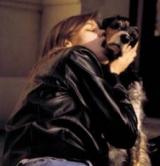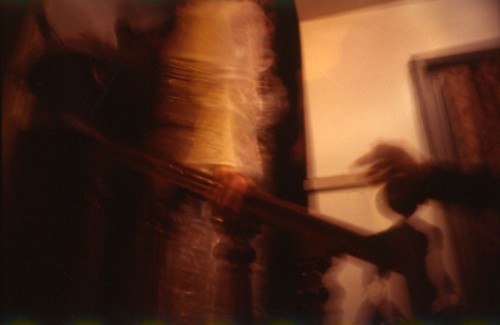dimanche, 10 mai 2009
L'avenir de la langue quechua, entretien avec Serafin Coronel-Molina
L'avenir du quechua... Parlons en en quechua !
Entretien en quechua avec Serafín Coronel-Molina, professeur à Princeton.
Il nous parle de sa langue maternelle, le quechua, des dangers qu'elle court et des moyens de la sauver. Il est convaincu que le quechua peut s'épanouir et tenir une place conséquente.
Une TRADUCTION ANGLAISE suit le texte quechua, plus bas dans la page
Serafín Coronel-Molinawan rimanakuy, qichwa rimaq linguista Estados Unidospi Princeton Yachay Wasipi yachachiq
Tapuq: Edith de Cornulier-Lucinière
Runasimi wiñaypaqmi kawsanqa
E.C.L.: ¿Imatataq ruwanchikman runasimiqa wiñaypaq kawsakunanpaq?
S.C.M.: Ñawpataqa, qichwa rimaqkunaqa, churi-wawanchikkunatam runasimita yachachinchikman. Imatapas runasimillapim paykunawan rimanchikman, runasimita rimastin kusi kusisqallaña wiñanankupaq. Chaykunata mana ruwaptinchikqa, qichwanchik chinkakunqachá, wañukunqachá. Hinaman, imaymana iskuylakunapipas, yachay wasikunapipas runasimipim churi-wawanchikkunaqa liyiytapas qillqaytapas yachanmanku qichwanchikta hatunyachinankupaq.
Hinaspa, kastillasimilla rimaqkunapas runasimitam yachanmanku. Chaymantaqa, tukuy rikchaq yachay wasikunapim yachachiqkuna runasimita yachachinmanku kastillasimi rimaqkunkaqa runasiminchikta yupaychanankupaq ima. Mana chay hina kaptinqa, manam allinchu kanman runasiminchikpaq.
Chaymantaqa, imaymana liwrukunata, willaykunata, periódicokunata, diccionariokunata, gramaticakunatam runasimipi qillqanchikman. Himaman, wayra wasipipas televisiónpipas qichwatam rimanchikman. Internetpipas imaymana runasimipi recursos nisqankunatam paqarichinchikman. Hinaspa, vídeokunata, grabaciónkunata, películakunata, CD-Romkunata, DVD-kunata, WebTV-nisqantapas runasimipim rikurichinchikman. Chaymantañataq, runasimillapim miskillataña qillqanakunanchik rimayninchikkunata sinchiyachinanchikpaq ima.
Qipamanqa, llapa Andes suyukunapi kamachiqkunaqa runasiminchiktam chaninchanman tukuy runakuna mana pinqakuspalla, mana chiqninakuspalla miskillataña imay punchawkamapas runasimipi rimanankupaq.
E.C.L.: ¿Allinchu kanman runasimipaq kastillasimi hina rimasqa kaptin? Hinaman, ¿políticapaqpas administraciónpaqpas runasimiqa allinchu kanman? ¿Runasimiqa chay dominiokunapi rimasqachu kanman utaq karu karusu urqukunap patanpi llaqtachakunallapichu kawsakunman?
S.C.M.: Runasimiqa kastillasimi hina rimasqa kaptin, hamuq watakunapi manamá wañunqachu. Aswanraq hatun sachakuna hinachá, sumaq waytakuna hinachá munay munaylla wiñakunqapas waytakunqapas.
Hinaspa, runasimiqa política nisqanpaqpas administración nisqanpaqpas allinmi kanman. Chaymi gobiernopi kamachiqkunaqa runasimitam rimananku, hinaman imaymana kamachikuykunatam paykunaqa rikurichinmanku runasimiqa allinllaña chaninchasqapas kusallaña amachasqapas kananpaq. Chaymantaqa, tukuy rikchaq kamachikuykunaqa runasimimanmi tikrasqa kanman. Congresopi políticokunañataq runasimipipas kastillasimipipas llaqtanchikkunarayku, suyunchikraykumá rimanakunmanku. Kay Declaración Universal de Derechos Lingüísticos nisqanpim kusa kusa imakunapas rikurichkan. Chay hatun kamachikuyta liyiyta nunaspa, kay llika kuchuman yaykuykuyyá http://www.egt.ie/udhr-es.html
Runasimita maypipas qispillam rimanchikman. Lliw Ande llaqtakunapipas suyukunapipasmi wiña wiñaypaq takyakunman. ¿Imanasqataq urqukunap patanpi karu karusu llaqtachakunallapi kawsakunman? Astawan, llapallanchikmi qichwata mirachinanchik, kallpachananchik, hatunyachinanchik hamuq watakunapi mana usukunanpaq. Mana wañunantamá, mana chinkanantamá munanchikman. Runasiminchik chinkarquptinqa, tukuy rikchaq yachayninchikmi chinkakunqa. Chaymi achkaraq ruwananchik kachkan qichwanchik hatarichinanchikpaqpas mirachinanchikpaqpas.
E.C.L.: ¿Imaraykum runasimita awsachinchikman? ¿Imaraykum tukuy rikchaq simikunata kawsachinchikman?
S.C.M.: Runasiminchik chinkakuptinqa, tukuy yachayninchikkunapas, rimayninchikkunapas, iñiyninchikkunapas wañukunmanmi. ¿Imanasqataq chaykuna chinkakunman? Manam allinchu kanman runasiminchikpaq, chaymi sunqunchikwan, kuyayninchikwan runasimita rimanchikman. Hinaspa, llapallanchikmi qichwanchikta allinta sayachinchikman, mirachinchikman imapas. Runasiminchik chinkakuptinqa, manachá imallamantapas ayllunchikunawan rimanakuyta atipasunchikchu.
Hinaman, tukuy rikchaq simikunapas allin yupaychasqa, chaninchasqam qispilla kawsakunan. Chay simikunaqa chinkakuptinqa, imaymana yachaykunam wañukunqa. Chaymantaqa, runakayninchikmi wakchayarqunman. UNESCO nisqan hina, tukuy pachapi suqta waranqa (6,000) simimanta, pichqa chunka por ciento (50%) nisqanmi wañunayan. Sapa iskay simanam huk simi chinkan. Hamuq watakunapi, Continente Americano nisqanpi qanchis pachak (700) simi, Africapi iskay pachak (200) simi, Asiapi pusaq chunka (80) simi, Europapiñataqmi tawa chunka (40) simi wañukunqa. Manchakuypaqmi chaykuna kachkan. Chaymi llapallanchik yanapanakuspa, rimanakuspa tiqsimuyuntinpi imaymana simikunata takyachinchikman, wañunayaqkunataqa rikchachinchikman, hatarichinchikman himanam kallpanchachinchikman. Wañusqa kaptinkupas, hebreo simita hinam kawsarichimunchikman.
E.C.L.: ¿Imaynam rimasqalla simita qillqasqa simiman kutichinchikman?
S.C.M.: Ñawpataqa, alfabeto nisqantam paqarichinchikman tiqsimuyuntinpi imaymana simikunata qillqanapaq. Hinaspa, tukuy rikchaq qillqakunatam huñuchinchikman llapa rikchaq simikunapi mana panta pantaspalla imakunamantapas qillqanapaq. Qipamanqa, ñawpapi nisqay hina, llapan rikchaq liwrukunata, diccionariokunata, gramaticakunata qillqanchikman. Hinaman, musuq rimaykunatam (vocabularies) rikurichinchikman ichaqa kuk simikunamantam chay rimaykunata mañakunchikman. Lliw simikunam musuq rimaykunata mañanakunku. Chay mañanakusqankunawanmi utqaylla musuqyakunkupas. Musuq rimaykunata paqarichisqanchikwanñataq allillamanta munay munaylla imaymana simikunaqa hatunyakunqaku.
Puchukaypi, imaymana qillqakunatam tukuy rikchaq simikunaman tikranchikman. Chay tikrasqanchikkunawanmi chay simikunaqa sinchiyakunqaku. Kaykunata ruwaspam rimasqalla simita qillqasqa simiman kutichinanchik. Chaykunamanta wanka qichwapi qillqasqayta qawanaykipaq kay llika kuchuman yaykuyyá http://www.vjf.cnrs.fr/celia/FichExt/Am/A_24_01.htm
Sunquymanta sulpay nisqayki runasimimanta rinamakusqanchikmanta. Hu kutikama.
E.C.L: Serafín, anchatam agradisiyki kay sumaq willakuyniykikunamanta. Hamuq watakunapi sumaqllaña purikuy, sumaqllaña kawsakuy.
English Version
Interview with Serafín Coronel-Molina, a Native Quechua Speaker Linguist Teaching at Princeton University, USA
Interviewed by Edith de Cornulier-Lucinière
E.C.L.: What can be done to preserve the Quechua language?
S.C.M.: First of all, we the Quechua speakers, should teach Quechua to our children. We should speak with them in Quechua about different topics, so they can grow up happily speaking Quechua. If we do not make such an effort, it is possible that our Quechua will die. Besides, our children should learn how to read and write at any school or learning center so they can revitalize our Quechua language.
In addition to this, the Spanish speakers should also learn Quechua. After that, educators established at different learning centers should teach Quechua so the Spanish speakers learn to valorize our Quechua. If it is not that way, it will have negative consequences for our language.
On the other hand, we should write all kinds of books, stories, newspapers, dictionaries and grammars in Quechua. Then, we should use Quechua on radio and television programs. We must post on the Internet a wide variety of materials, and we must also produce in the Quechua language videos, audio recordings, films, CD-Roms, DVDs, and Web-TV programs. In addition to all this, it is necessary for us to write in Quechua to strengthen our language.
Last but not least, the authorities all over the Andes should valorize our language, so everybody can communicate in Quechua without shame and without fighting each other
E.C.L.: Would it be good for the Quechua language to be used like the Spanish language, and become a political and administrative language? Or would it better used in other functional domains or only in the rural communities themselves?
S.C.M.: If Quechua is spoken like Spanish, it will not die in the future. On the contrary, the Quechua language will grow beautifully like trees and flowers.
The Quechua language can be used in politics and administration without any problem. That is why the governmental authorities must speak Quechua. Then, different kinds of laws must be produced in Quechua, so our language will be well valorized and protected. All legal documents should be translated into Quechua. Then, the politicians in Congress should use both Quechua and Spanish in their deliberations on behalf of our cities and country. In the Universal Declaration of Linguistic Rights I include here, information related to what I am trying to explain here can be found. If you would like to read the content of this document, please follow the following link: http://www.egt.ie/udhr-es.html
E.C.L.: Why do we have to protect the Quechua language? Why do we have to save any language?
S.C.M.: If our Quechua disappears, all our knowledge, our words and our beliefs will die. Why should they disappear? That would not be good, that is why we should speak the language with love. All of us should rouse and spread our Quechua by all means possible. If our language disappears, we will not be able to use our language to talk about anything with our family.
Every language should be well valorized and live in freedom. If those languages die, a wide variety of knowledge will disappear forever. The richness of our humanity will become impoverished. According to UNESCO, of 6,000 languages spoken around the world, 50% are in danger of extinction. Every two weeks one language dies. In the coming years, in the American Continent 700 languages will die, in Africa 200 languages, in Asia 80 languages, and in Europe 40 languages will die. These are alarming figures. For these reasons, everybody, by helping each other and through dialogue, should make efforts to preserve, awake and revitalize the wide variety of languages scattered around the world. If they are already dead, they must be revived like as was done with the Hebrew language.
E.C.L.: How can we turn a primarily oral language into a written one?
S.C.M.: First of all, alphabets should be elaborated for the different languages and dialects around the world. According to their contexts, it is essential to unify the writing system of a given language in order to avoid mistakes and misunderstanding. As I mentioned earlier, it is necessary to elaborate in Quechua a wide variety of books, dictionaries and grammars. Besides, it is crucial to coin new vocabularies or to borrow new words from other languages. All languages borrow news words from each other. With those new loanwords languages modernize rapidly. With the coinage of new terminologies, any language develops beautifully little by little.
Finally, it is imperative to carry out translations into any language. With these translations existing languages will become vital. By making all these efforts, we turn a primarily oral language into a written one. To read what I wrote in Huanca Quechua about all these issues, please click on this link: http://www.vjf.cnrs.fr/celia/FichExt/Am/A_24_01.htm
That is all I can say.
Thank you very much for this interview. Until next time.
E.C.L.: Serafín, I am very thankful for all the information you provided me. I wish you the very best in your future endeavors.
Publié dans Le corps, Ὄνειροι | Lien permanent | Commentaires (1) |  |
| ![]() Facebook |
Facebook |  Imprimer |
Imprimer |















Commentaires
Écrit par : MyLove | vendredi, 24 juillet 2009
Les commentaires sont fermés.